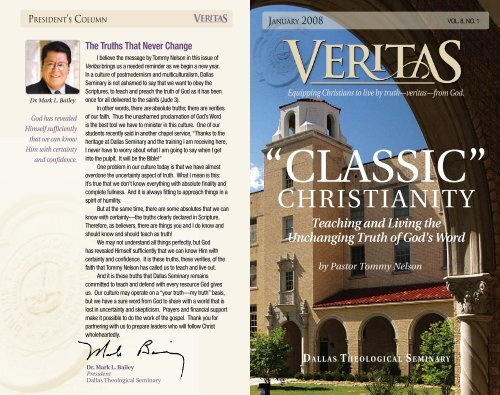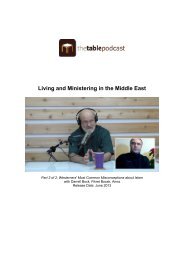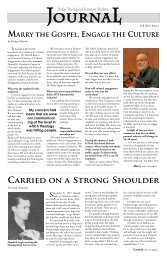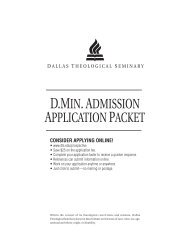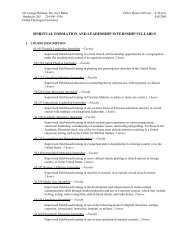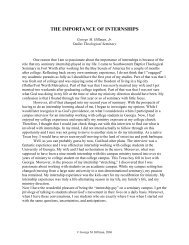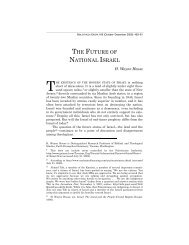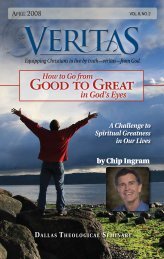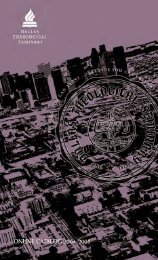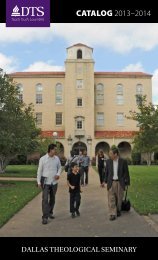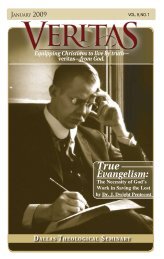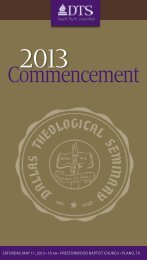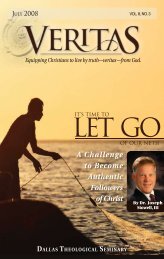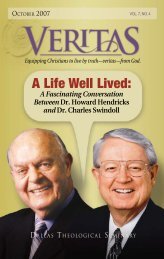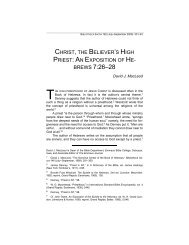Veritas January 2008 - Dallas Theological Seminary
Veritas January 2008 - Dallas Theological Seminary
Veritas January 2008 - Dallas Theological Seminary
You also want an ePaper? Increase the reach of your titles
YUMPU automatically turns print PDFs into web optimized ePapers that Google loves.
President’s Co l u m n<br />
Ja n ua ry <strong>2008</strong><br />
VOL. 8, NO. 1<br />
Dr. Mark L. Bailey<br />
God has revealed<br />
Himself sufficiently<br />
that we can know<br />
Him with certainty<br />
and confidence.<br />
The Truths That Never Change<br />
I believe the message by Tommy Nelson in this issue of<br />
<strong>Veritas</strong> brings us a needed reminder as we begin a new year.<br />
In a culture of postmodernism and multiculturalism, <strong>Dallas</strong><br />
<strong>Seminary</strong> is not ashamed to say that we want to obey the<br />
Scriptures, to teach and preach the truth of God as it has been<br />
once for all delivered to the saints (Jude 3).<br />
In other words, there are absolute truths; there are verities<br />
of our faith. Thus the unashamed proclamation of God’s Word<br />
is the best tool we have to minister in this culture. One of our<br />
students recently said in another chapel service, “Thanks to the<br />
heritage at <strong>Dallas</strong> <strong>Seminary</strong> and the training I am receiving here,<br />
I never have to worry about what I am going to say when I get<br />
into the pulpit. It will be the Bible!”<br />
One problem in our culture today is that we have almost<br />
overdone the uncertainty aspect of truth. What I mean is this:<br />
It’s true that we don’t know everything with absolute finality and<br />
complete fullness. And it is always fitting to approach things in a<br />
spirit of humility.<br />
But at the same time, there are some absolutes that we can<br />
know with certainty—the truths clearly declared in Scripture.<br />
Therefore, as believers, there are things you and I do know and<br />
should know and should teach as truth!<br />
We may not understand all things perfectly, but God<br />
has revealed Himself sufficiently that we can know Him with<br />
certainty and confidence. It is these truths, these verities, of the<br />
faith that Tommy Nelson has called us to teach and live out.<br />
And it is these truths that <strong>Dallas</strong> <strong>Seminary</strong> remains<br />
committed to teach and defend with every resource God gives<br />
us. Our culture may operate on a “your truth—my truth” basis,<br />
but we have a sure word from God to share with a world that is<br />
lost in uncertainty and skepticism. Prayers and financial support<br />
make it possible to do the work of the gospel. Thank you for<br />
partnering with us to prepare leaders who will follow Christ<br />
wholeheartedly.<br />
Equipping Christians to live by truth—veritas—from God.<br />
“Classic”<br />
Christianity<br />
Teaching and Living the<br />
Unchanging Truth of God’s Word<br />
by Pastor Tommy Nelson<br />
Dr. Mark L. Bailey<br />
President<br />
<strong>Dallas</strong> <strong>Theological</strong> <strong>Seminary</strong><br />
D a l l a s Th e o l o g i c a l Se m i n a r y
Ch a p e l Speaker<br />
Pastor Tommy Nelson is a graduate of the University<br />
of North Texas, where he was quarterback on the football team.<br />
He attended <strong>Dallas</strong> <strong>Theological</strong> <strong>Seminary</strong> from 1977 to 1982<br />
while serving as an associate pastor of Denton Bible Church. He<br />
has been ministering at Denton Bible Church for 27 years and is<br />
presently the senior pastor. He also serves on the <strong>Seminary</strong>’s Board<br />
of Incorporate Members.<br />
Many <strong>Veritas</strong> readers will remember one of the most infamous blunders<br />
in U.S. marketing history: the attempt by the Coca-Cola ® company<br />
to discard its classic formula and introduce a product known as the<br />
“New Coke.” In this powerful message, Pastor Tommy Nelson uses this<br />
incident to illustrate our need to hold to “classic” Christianity. —Editor<br />
Tommy Nelson has written The Big Picture, The Book of Romance,<br />
and The Problem of Life with God: A Commentary on the Book of<br />
Ecclesiastes. His fourth book, Better Love Now, is being released<br />
this month. He is also the teacher for three video series, and his<br />
taped messages travel throughout the world.<br />
He married his best friend, Teresa Newman, in August 1974.<br />
The Nelsons have two sons: Benjamin, who works for the U.S.<br />
Department of Homeland Security, and John Clark, who is playing<br />
professional baseball.<br />
Pastor Tommy Nelson presented this message in a recent chapel<br />
service at <strong>Dallas</strong> <strong>Seminary</strong> recognizing our Board of Incorporate<br />
Members.<br />
“Classic”<br />
Christianity<br />
Teaching and Living<br />
the Unchanging Truth<br />
of God’s Word<br />
by Pastor Tommy Nelson<br />
For your free subscription to <strong>Veritas</strong>, visit www.dts.edu or call 800.DTS.WORD<br />
D a l l a s Th e o l o g i c a l Se m i n a r y<br />
3909 Swiss Avenue • <strong>Dallas</strong>, TX 75204 • 214-824-3094<br />
<strong>Veritas</strong> is a publication of <strong>Dallas</strong> <strong>Seminary</strong> for our valued friends and partners, designed to provide biblical encouragement<br />
and instruction in keeping with our strong commitment to minister to those who stand with us in prayer<br />
and financial support. We are pleased to present the messages of outstanding leaders and Bible teachers who<br />
speak during chapels and at other events, as a way of bringing you “on campus” with us and giving you the benefit<br />
of their insights. <strong>Veritas</strong> is also available online at our website, www.dts.edu/veritas.<br />
For several generations leading up to the<br />
1960s, Coca-Cola ® was clearly the dominant<br />
soft drink in America. So in the 60s, rival soft drink<br />
Pepsi made a crucial marketing decision. The company<br />
decided that if the older generation was loyal to Coke, that<br />
was fine; they would target the younger generation, which<br />
gave rise to the “Pepsi Generation” advertising campaign.<br />
Da l l a s Th e o l o g i c a l Se m i n a r y<br />
1
When you<br />
have a<br />
classic,<br />
you don’t<br />
change it<br />
just because<br />
of the<br />
pressure<br />
of a new<br />
generation.<br />
To counter this move and recapture the<br />
youthful cola market, Coke decided to come out<br />
with something new of its own and announced the<br />
“New Coke,” a reformulation of its classic drink<br />
that America had been enjoying for decades. If you<br />
remember the arrival of the New Coke, you’ll also<br />
remember that it was arguably the greatest business<br />
marketing blunder of all time.<br />
Loyal Coke drinkers protested vociferously.<br />
What was Coke thinking, messing around with<br />
a winning formula? The negative outcry was<br />
overwhelming. We’re told that the day Coke<br />
introduced its new product, the Pepsi company<br />
gave its entire corporation the day off. They partied,<br />
figuring Pepsi had won the cola war. They had<br />
forced Coke to compromise and change, and now<br />
Pepsi could take over the market.<br />
But then Coke made what was called the<br />
greatest stroke of marketing genius in history. They<br />
apologized nationally, saying they realized that<br />
Coke was an American institution. They pulled<br />
New Coke off the shelves and brought back the<br />
original formula under the name of Classic Coke.<br />
That name was not only a signal to the soft drink<br />
market that the familiar Coke had come back, but<br />
it was also a recognition of the fact that when you<br />
have a classic, you don’t change it just because of<br />
the pressure of a new generation.<br />
We Must Stand on the Truth<br />
This is the basic message the author of Hebrews<br />
wanted to deliver to his readers, who were going to<br />
become the next generation of Christians following<br />
the generation of the apostles and prophets. In<br />
Hebrews 13, the author gave some practical<br />
admonitions in verses 1–6, and then in verses 7–16<br />
he turned to the importance of their standing on<br />
the truth of the message that had been delivered to<br />
them by the apostles.<br />
Verse 7 reads, “Remember your leaders,<br />
who spoke the word of God to you. Consider the<br />
outcome of their way of life and imitate their faith.”<br />
The author of Hebrews wanted his readers to mimic<br />
the faith of their leaders.<br />
Paul said the Church is “built on the foundation<br />
of the apostles and prophets, with Christ Jesus<br />
himself as the chief cornerstone” (Ephesians 2:20).<br />
It was to the apostles that Jesus gave the keys to<br />
the kingdom so they could bind what heaven has<br />
bound and loose what heaven has loosed. It was to<br />
the apostles that the truth of our faith was once for<br />
all delivered (Jude 3). We Christians have a body of<br />
truth that is complete.<br />
And so the author of Hebrews told the new<br />
generation of believers to remember and mimic the<br />
faith of their leaders. In other words, don’t depart<br />
from the ancient message that has been brought to<br />
you about Jesus Christ from His Word.<br />
The Truth of Christ Never Changes<br />
Some things don’t change, as the next verse<br />
of Hebrews 13 affirms: “Jesus Christ is the same<br />
yesterday and today and forever” (v. 8). Jesus was<br />
the same when the apostles and apostolic delegates<br />
brought the message of Scripture to the early<br />
believers, He is the same today in our experience,<br />
and He will be the same forever. Perfection doesn’t<br />
change. The Word of God stands forever (Isaiah<br />
40:8). We may change our style of dress in the<br />
church, we may change our architecture, and we<br />
2 Classic Christianity Da l l a s Th e o l o g i c a l Se m i n a r y 3
Message<br />
may change our approach to ministry and<br />
our organization.<br />
But the core message of the inerrancy of the<br />
Bible that sets forth our Lord Jesus Christ in His<br />
deity, His perfect humanity, His substitutionary<br />
death to propitiate the Father and redeem us, His<br />
bodily resurrection, His sending forth of the Holy<br />
Spirit, His present session in heaven, His headship<br />
in the Church, and His gathering of His elect—these<br />
things don’t change!<br />
Dr. Mark Bailey said that one of the men who<br />
mentored him in Bible college used to say, “If it’s<br />
new, it’s not true. And if it’s true, it’s not new.”<br />
That’s what the author of Hebrews said in 13:9:<br />
“Do not be carried away by all kinds of strange<br />
teachings.” Don’t put your finger up to the wind to<br />
Don’t put your finger up to<br />
the wind to tell which way<br />
the wind of popular<br />
opinion is blowing.<br />
Don’t trim your sails to<br />
the spirit of your age.<br />
tell which way the wind of popular opinion<br />
is blowing. Don’t trim your sails to the spirit of<br />
your age. There is an old saying that if the Church<br />
weds itself to the spirit of the age, it’s going to be<br />
a widow within one generation, because the world<br />
is always changing.<br />
False Ideas Will Always Be Around<br />
In 1 Timothy 4:1, Paul wrote, “The Spirit clearly<br />
says that in later times some will abandon the faith<br />
and follow deceiving spirits and things taught by<br />
demons.” Jesus said it is inevitable that stumbling<br />
blocks will come. Later, Paul said, “For the time<br />
will come when men will not put up with sound<br />
doctrine. Instead, to suit their own desires, they will<br />
gather around them a great number of teachers to<br />
say what their itching ears want to hear. They will<br />
turn their ears away from the truth and turn aside to<br />
myths” (2 Timothy 4:3–4).<br />
Is doctrinal error going to come? Yes! The New<br />
Testament has no illusions that the Church will<br />
establish a utopia down here. That’s why the book<br />
of Hebrews tells us not to be carried away by strange<br />
and varied teachings. As Christians, we are a people<br />
of dogma; we are a people of revelation; we are a<br />
people of truth. False doctrines and new ideas are<br />
coming, and they’re already here. But the Word of<br />
God stays true.<br />
The best verse I have ever heard on preaching is<br />
2 Corinthians 2:15: “For we are to God the aroma of<br />
Christ among those who are being saved and those<br />
who are perishing.” We who preach the Word of<br />
God do our preaching unto Him. And the thing that<br />
God loves most is the aroma of His Son’s sacrifice for<br />
sin in obedience to His Father for us. God loves it,<br />
and we are an aroma of that victory to Him.<br />
Paul went on to say that to those who are<br />
perishing, “we are the smell of death” (v. 16). The<br />
message of Christ is not a popular message to<br />
deliver to a world that is enamored with new ideas<br />
and strange teachings that depart from the truths<br />
4<br />
Classic Christianity<br />
Da l l a s Th e o l o g i c a l Se m i n a r y<br />
5
Message<br />
6 Classic Christianity<br />
of classic Christianity. How people respond to our<br />
message and our witness as believers is not our<br />
business. Our job is to preach and teach the truth.<br />
The famed author William F. Buckley once<br />
talked about the lack of truth in our day. He said<br />
the only way in our day we could get America to<br />
quit being immoral is to convince people that<br />
“fornication is fattening.” In a world like this, our<br />
calling is to speak the message of God with what<br />
Paul called “sincerity” (2 Corinthians 2:17). This<br />
is a Greek word that means “sun tested,” and the<br />
imagery here is very interesting and instructive.<br />
In the days of Paul, the way to tell if a piece of<br />
pottery was of the best quality was to hold it up to<br />
the sun. If a piece of pottery was one of quality, if it<br />
was “sincere,” then it could stand up to the test of<br />
Classic Christianity<br />
is the real item—<br />
the faith delivered without<br />
error from Christ to His<br />
Church through the<br />
apostles and prophets.<br />
being examined in the sun because it had no cracks.<br />
But a potter who was just trying to produce a piece<br />
as quickly as possible without regard to quality<br />
would fill the cracks with paraffin wax to try and hide<br />
them. But when an inferior piece of pottery was held<br />
up to the sun, the person could see the wax filling<br />
the cracks.<br />
This test was the basis of the Latin word from<br />
which our English word “sincerity” comes (sine,<br />
meaning “without,” and cereus, meaning “wax”).<br />
Being sincere means that you don’t have any wax in<br />
the cracks of your life. It means you are the real item.<br />
That’s what classic Christianity is, the real item. It’s<br />
the faith delivered without error from Christ to His<br />
Church through the apostles and prophets.<br />
A Heritage of Faithfulness<br />
to the Truth of Christ<br />
Whenever I leave my study at our church in<br />
Denton to walk out into the pulpit, I pass under a<br />
little frame hanging above my study door. It’s a<br />
pamphlet from the 1930s containing the doctrinal<br />
statement of <strong>Dallas</strong> <strong>Theological</strong> <strong>Seminary</strong>. I prize<br />
that pamphlet over everything else in my study<br />
because I was proud in the good sense of the<br />
word to be part of this school. One of the greatest<br />
delights in my life is to sit with the men and women<br />
who serve with me on the <strong>Seminary</strong>’s Board of<br />
Incorporate Members.<br />
I am proud of <strong>Dallas</strong> <strong>Seminary</strong>. When people<br />
tell me they are looking for a good seminary and<br />
ask me if I have any ideas, I say, “As a matter of fact,<br />
I do.” I am happy to recommend <strong>Dallas</strong> <strong>Seminary</strong><br />
to them.<br />
And when I walk out of my study and<br />
pass underneath that pamphlet over my<br />
door containing the <strong>Seminary</strong>’s statement<br />
of classic Christian doctrine, I feel as if I am<br />
representing the leaders who have gone before<br />
me in this place—those who stood for the truth<br />
of Scripture beginning in the 1920s when the<br />
major denominations were going south as<br />
they embraced liberalism and evolution and<br />
Da l l a s Th e o l o g i c a l Se m i n a r y<br />
7
In Appreciation f o r Yo u r Support o f Da l l a s Se m i n a r y . . .<br />
existentialism and the like. But our leaders stood<br />
firm, and it is up to us to imitate their faith.<br />
8<br />
Our<br />
churches<br />
should<br />
be full of<br />
worship,<br />
and we<br />
should not<br />
neglect to<br />
do good and<br />
share with<br />
others.<br />
Classic Christianity<br />
We May Have to Suffer for the Truth<br />
The writer of Hebrews continued in chapter 13<br />
to say that following Christ and imitating our leaders’<br />
faith may involve suffering (vv. 11–12). Jesus had to<br />
suffer outside the city of Jerusalem just as the priests<br />
of Israel took their sin offerings outside the city to<br />
burn them. They didn’t want Jesus inside their city,<br />
and we may not always be wanted in our cities. I’ve<br />
been a pastor for a long time in my city, and a lot<br />
of people still look at me kind of crazy because our<br />
church is a Bible church where we preach and study<br />
and believe the Word.<br />
But that’s OK, because it doesn’t matter what<br />
people think. We are called to “go to [Jesus] outside<br />
the camp, bearing the disgrace he bore” (Hebrews<br />
13:13). If we have to be outside of the camp of<br />
religion and of error to be identified with Christ, then<br />
so be it.<br />
But there’s more to our calling than suffering.<br />
Notice the reference to worship and singing in<br />
Hebrews 13:15 and to service in verses 16–17.<br />
Classic Christianity is not a stuffy business. We are<br />
to continually use our lips to praise and give thanks<br />
to the Lord. Have you ever seen Plato’s hymnal? No,<br />
because there isn’t one! We as Christians are the<br />
ones who have a song to sing. Our churches should<br />
be full of worship, and we should not neglect to do<br />
good and share with others.<br />
The Church’s greatest commodity is the classic<br />
truths of our faith. People don’t want a show or a<br />
novelty. They don’t want “New Coke,” if you will.<br />
They want the classic; they want the truth. And that<br />
is our greatest commodity.<br />
Here’s a Book That Will Help You Answer<br />
the False Claims of Modern Skeptics<br />
Who Slander God and His Word<br />
You’ve heard the so-called news reports that have been<br />
flashed across the worldwide media over the past few<br />
years. Many of these claims are made by admitted<br />
skeptics who boast that they have found new evidence<br />
that contradicts the teaching of Scripture.<br />
The claims made by these “experts” often sound so<br />
convincing that even sincere Christians can have their<br />
faith shaken, causing them to ask: Is it true that Jesus<br />
wanted and needed Judas to betray Him? Can it be that<br />
Jesus escaped the crucifixion? Is it possible that Jesus’<br />
family tomb has been discovered?<br />
Dr. Erwin Lutzer, senior pastor of The Moody Church<br />
in Chicago and a graduate of <strong>Dallas</strong> <strong>Seminary</strong>, provides<br />
a clue to the answers in the very title of his new book:<br />
Slandering Jesus: Six Lies People Tell About the Man<br />
Who Said He Was God. In this important volume,<br />
Dr. Lutzer draws on rigorous biblical research to set the<br />
record straight. Send for your copy today, and learn how<br />
to counter lies and defend the truth about Christ!<br />
To receive this resource as our thank you for your<br />
support of <strong>Dallas</strong> <strong>Seminary</strong>, use the enclosed reply card<br />
(for subscribers) or call 800-DTS-WORD X3722. Thank you!


